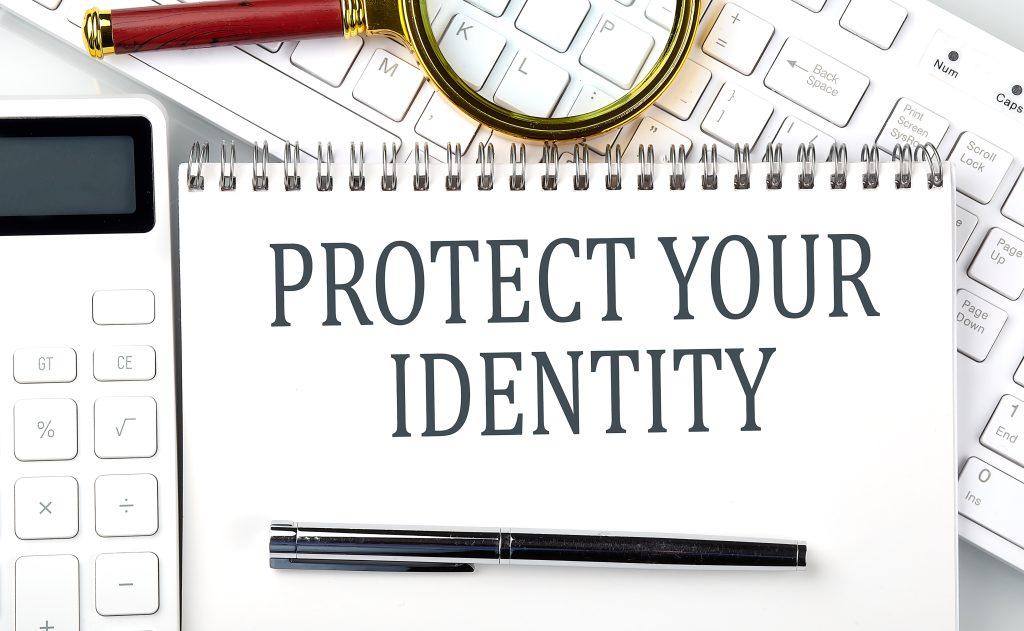By Amy Miller, AFC®

Identity theft happens when someone obtains your personal information and uses it without your permission. Identity thieves gain access to Social Security numbers, dates of birth, addresses, and account numbers by stealing mail, hacking computers and/or cell phones, or through e-data breaches. gaining access to your social security number, date of birth, address, and account numbers. They can use the information to set up fraudulent accounts, establish credit in the victim’s name, make purchases, open utilities, use health insurance, or steal tax refunds.
According to CNBC, as many as 1 in 10 people are victims of identity theft annually in the U.S. Having your identity stolen can result in serious damage. It can affect your finances, your career, and your credit history. It can affect your ability to get a loan, purchase or rent a home, qualify for insurance coverage, or be considered employable for certain positions.
Know the Signs of Identity Theft
Below is a list of “red flags” that could indicate that someone else is using your personal information fraudulently.
- Receiving unexpected credit card or account statements
- Bank statements or bills do not arrive as usual
- Receiving calls or letters from unknown debt collectors
- You are denied a loan or credit account
- Unrecognized or unauthorized charges on your credit cards or bank accounts
- Getting a bill for medical procedures you did not receive
- Finding out a tax return has been filed in your name
- Accounts that you did not open on your credit report
What to do if your Identity is Stolen
If you find that you are a victim of identity theft, acting quickly is key. Here are some steps you should take immediately to stop any further fraudulent activity.
- Freeze your Credit Report and place a fraud alert on each
- Review all three full credit reports via annualcreditreport.com
- Report to the Federal Trade Commission that your identity has been stolen
- Contact the fraud department of any companies where accounts have been fraudulently opened and explain that your identity has been stolen – request that they close and freeze the accounts
- Change all account logins, passwords, and PINs
- File a report with your local police department
Recovering from Identity theft can take weeks, months, or even years. Unfortunately, even after recovering, there is a high likelihood that you can become a repeat victim if you don’t properly protect yourself. CNBC also reported that approximately 21% of victims are targeted multiple times.
Preventing Identity Theft
Keeping your information safe and secure is the key to protecting your identity. Here are a few steps you can take:
- Review your credit report regularly. You can get a free report weekly until December 2023 via annualcreditreport.com
- Freeze your credit report at any of the three major credit reporting agencies by applying online or by calling them directly
- Equifax (800) 349-9960
- Experian (888) 397-3742
- TransUnion (888) 909-8872
- Review account statements upon delivery
- Always use a VPN (Virtual Private Network) when accessing public internet connections
- Collect your mail daily or open a Post Office Box
- Shred documents containing personal information
- Create different passwords for each account
- Install anti-virus software
- Remove all personal information from computers before disposing of them
Expand Your Knowledge
Annually, the Federal Trade Commission (FTC) focuses on Identity Theft Awareness with a week of free events outlining how identity theft affects people across the country and offers tips on how to reduce your risk. From January 30 – February 3, 2023, you can access an array of free webinars, podcasts, and Facebook Live Events discussing how to spot and avoid scams and identity theft.